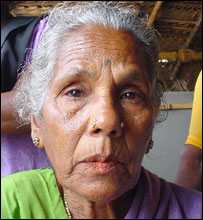|
|
India's Tsunami Elderly Cast Away
By Sunil Raman, BBC News
India
January 16, 2006

Anjanamma says the social fabric of the community has been torn
A few elderly survivors of last year's tsunami sit huddled under a leaky roof in one of the many shelters in Nagapattinam in India's Tamil Nadu state - the nation's worst affected area. An overpowering stench of sewage fills the air. Wrapped in faded saris with unkempt hair, they discuss their future. The government and local charities have been too busy with the issue of people's livelihood to focus on elderly people. It is the children and young people who have been targeted by charities providing psychological counselling. Anjanamma, 63, lost four of her grandchildren to the wave. "I sold cigarettes and snacks to fishermen going to sea. I will never forget that morning - the sound of tsunami waves crashing onto the settlement of Ariyanattu Street," says Anjanamma, with tears rolling down her cheeks. "There were too many deaths in our settlement. Many youngsters have abandoned their families," she says.
Haunted
The government and local charities have finished disbursing financial assistance. Many have been given boats and nets. The government wants youngsters to get back on their feet. As she sits in the temporary shelter still waiting to move into a permanent house, Anjanamma says the social fabric of her community has been torn by the tsunami. "I cannot live on the coast anymore. I am haunted by the sound of roaring waves," she says. Others join her in expressing their fear of water. The heavy rains of the past few weeks have added to their woes. Every now and then rumours of another tsunami rekindle their fears. They had lived along the sea for generations without any fear. But their relationship with the ocean changed completely when the tsunami struck. "We never heard of something like this from our parents or grandparents," says 67-year-old Parnavi.
Before the tsunami she could earn 40 rupees (less than $1) a day collecting small fish from the fishing nets. But her arthritis has worsened in the past few month and she has stopped going. For generations, the elderly depended on their relatives to take care of them. But now many have moved on. Devaki, 62, looks stoic. She does not say a word till asked. "I lost one son and a daughter-in-law along with two grandchildren. My surviving son and daughter-in-law took the financial compensation and left us. I have no-one to look after us," says Devaki. Govindaraj, 62, says he is too old to venture to sea. Three of his sons have moved out to start independent lives since last December. "My one unmarried son is with me and he earns by selling some fish. We will be on our own once he marries too," says Govindaraj.
'No fish'
Phelomen, 34, explains the dilemma facing young people after the tsunami. He says many youngsters from the fishing community now fear the sea. Parnavi and Govindaraj are among those fearing for the future "We want alternative jobs but do not know what to do. Those who have got fishing nets and go to sea return with little or no fish." The Academy for Disaster Management and Education, Planning and Training (Adept) has started up in neighbouring Cuddalore district to help tsunami survivors. Paul Patrick, who is a counsellor with Adept, says most people are still suffering depression, sleeplessness and are showing withdrawal symptoms. He says one old woman went into deep depression after her grandchild slipped from her arms and died. "Anjana Devi's daughter-in-law held her responsible for the child's death and left the house. It took us many months to make her at least talk about the incident," he said. Many younger survivors of the tsunami are often too busy tackling their personal trauma to look after the old and the government, too, may believe its priorities lie elsewhere.
|
|



